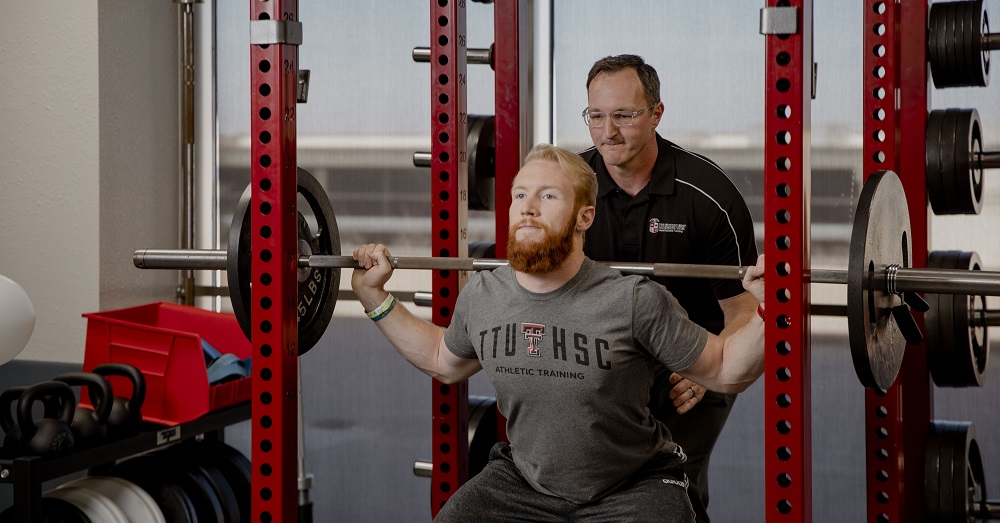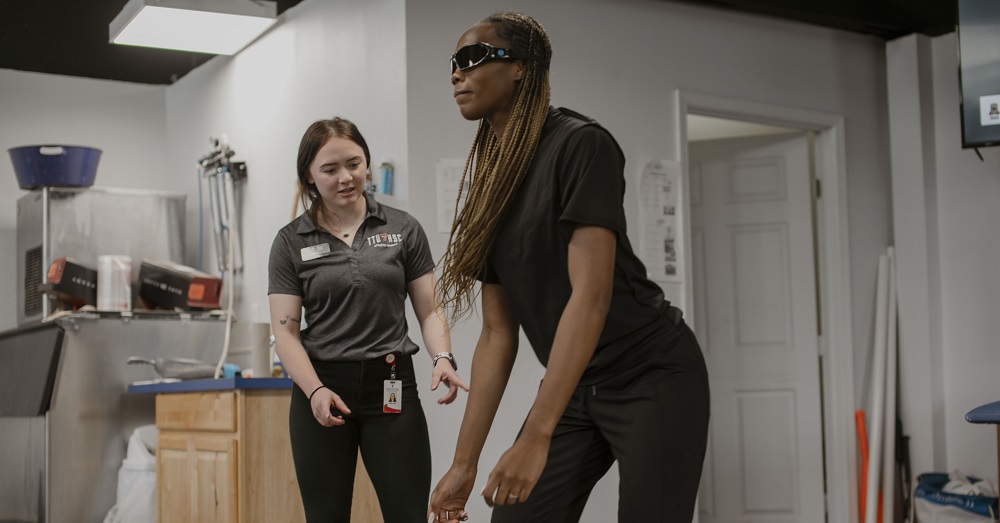How Athletic Trainers Help Athletes Prepare for a New Season
Athletic trainers play a vital role in monitoring athlete health, both leading up to and during the playing season.

Toby Brooks, Ph.D.
As athletes gear up for a competitive season, their training routines undergo crucial changes to optimize their performance on the field. We sat down with Toby Brooks, Ph.D., LAT, ATC, to discuss the current approaches to training and how athletic trainers support athletes at this important point in their season.
Brooks is an Associate Professor and Director of the Athletic Training Program of the TTUHSC School of Health Professions.
The Evolving Athletic Training Landscape
Brooks explains that athletic training has undergone significant evolution to prioritize efficiency and safety. Gone are the days of outdated training models that relied on grueling conditioning during camps to get athletes into shape. Instead, a more streamlined approach to training has emerged, emphasizing the importance of athletes arriving in good physical condition before the season starts.
“If you're trying to get in shape during camp, you're already way behind,” Brooks says. “Having to try to get into condition at the same time is a really heavy load, physically and psychologically.”
This shift has not only improved performance but also reduced the risk of injuries and burnout.
Furthermore, in response to unfortunate incidents of heat illness and deaths, policies now mandate the presence of trained professionals during conditioning sessions to ensure adequate supervision and prevent tragedies.
The Role of Athletic Trainers

Athletic training has undergone significant evolution to prioritize efficiency and safety
Due to the occurrence of heat-related illnesses and athlete deaths resulting from unsupervised conditioning, policies have been implemented by organizations such as the NCAA to ensure that trained professionals are present during conditioning sessions.
“We hate that that's the reason why,” Brooks says, “But hopefully the outcome is that no one else has to go through what those parents and families had to go through.”
Athletic trainers play a vital role in monitoring athlete health, particularly regarding the risk of heat illness, which can affect anyone. They are also involved in pre-participation physical examinations, often conducted late in the spring semester, to identify any underlying issues or conditions that may pose a risk to the athletes. By recognizing potential risks, such as heart abnormalities or dysfunctions, athletic trainers can refer at-risk athletes for further evaluation, aiming to prevent sudden-athlete death.
Additionally, athletic trainers are responsible for monitoring and supporting the health and recovery of athletes, who may have had a late-season injury or surgery, ensuring they are adequately restored before the upcoming season, even if it means engaging in intense rehabilitation sessions or providing encouragement and support.
Athletic Trainers: Building Relationships and Providing Support
The relationship that forms between an athlete and trainer is one aspect of the profession that Brooks is the most grateful for. Unlike physical therapy, where insurance often dictates the number of visits and coverage, athletic trainers have the opportunity to be embedded in traditional school settings as part of the staff.
“I love that about the profession, because it really does give you an opportunity to get to know your patient on a level that the other model prohibits you from being able to do,” he says.
The value provided by athletic trainers increases with their utilization, and their care is not billed through insurance. This allows for a closer connection and more personalized treatment with patients, as the athletic trainers can invest more time and effort into their care.
“There have been times in my career where I did treatments four times a day with an athlete trying to get them ready for an upcoming game,” Brooks recalls.
Hands-On Athletic Training at TTUHSC
Just as many athletes use the summer months to prepare for an upcoming season, athletic training students get to work with the program beginning late May or early June. Foundational training is emphasized, including techniques like taping, splinting and rudimentary evaluation skills. The students also learn about emergency care and obtain CPR certification.
Brooks explains that simulation plays a crucial role, with mock scenarios conducted in real environments, including Texas Tech athletics and community clinical sites.
“We want them to sort through and make mistakes during those simulations and labs,” he says. “They’re never going to be in those circumstances as a student in our program without a certified preceptor on site.”
The aim is to provide as close to real-world experience as possible, working with authentic equipment and alongside preceptors. This approach ensures that, when faced with emergencies, students are well-prepared, familiar with emergency action plans and able to handle situations, even if not identical to those practiced.
As training methodologies continue to evolve and athletes continue to seek ways to reduce injury and find peak performance, athletic trainers play a crucial role in providing knowledge and support as well as being on hand for life threatening accidents and injuries.
Related Stories
TTUHSC Receives $1 Million Gift from Amarillo National Bank to Expand and Enhance Pediatric Care in the Panhandle
TTUHSC School of Medicine leaders accepted a $1 million philanthropic gift from Amarillo National Bank on Tuesday (Feb. 10), marking a transformational investment in pediatric care for the Texas Panhandle.
Texas Tech University Health Sciences Center Permian Basin Announces Pediatric Residency Program Gift
TTUHSC Permian Basin, along with the Permian Strategic Partnership and the Scharbauer Foundation, Feb. 5 announced a gift that will fund a new pediatric residency.
The Ph.D. Programs that Shape Health Care
The Graduate School of Biomedical Sciences Ph.D. programs at TTUHSC provide the foundation, mentorship and research opportunities you need to pursue groundbreaking work.
Recent Stories
The John Wayne Cancer Foundation Surgical Oncology Fellowship Program at Texas Tech University Health Sciences Center Announced
TTUHSC is collaborating with the John Wayne Cancer Foundation and has established the Big Cure Endowment, which supports the university’s efforts to reduce cancer incidence and increase survivability of people in rural and underserved areas.
TTUHSC Receives $1 Million Gift from Amarillo National Bank to Expand and Enhance Pediatric Care in the Panhandle
TTUHSC School of Medicine leaders accepted a $1 million philanthropic gift from Amarillo National Bank on Tuesday (Feb. 10), marking a transformational investment in pediatric care for the Texas Panhandle.
Texas Tech University Health Sciences Center Permian Basin Announces Pediatric Residency Program Gift
TTUHSC Permian Basin, along with the Permian Strategic Partnership and the Scharbauer Foundation, Feb. 5 announced a gift that will fund a new pediatric residency.
